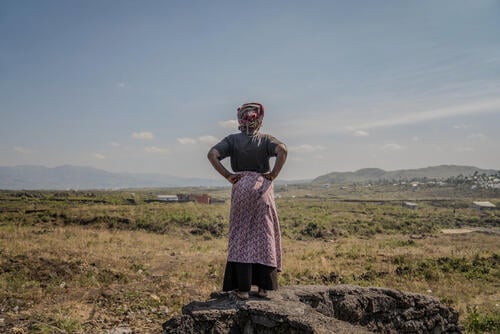- A survey by MSF’s epidemiology arm Epicentre in North Kivu province, DRC, shows high levels of sexual violence in displacement camps near Goma.
- More than one in 10 women aged 20 – 44, had experienced sexual violence in the five months before the survey in April 2024.
- MSF urges authorities to guarantee the security of displaced people’s camps and to increase access to food assistance, and income-generating activities.
Paris - A new survey carried out by Epicentre, Médecins Sans Frontières’ (MSF) epidemiological and medical research arm, among displaced people in four camps around Goma in Democratic Republic of Congo (DRC), shows alarming rates of violence, particularly sexual violence, continuing daily in and around the camps. More than one in 10 young women report having been raped in the period covered by the survey, November 2023 - April 2024 [in French]. MSF renews our appeal to the authorities and aid agencies to guarantee the protection of displaced people, and to respond adequately to the epidemic of violence.
Conducted among households of displaced people living in four camps, in total housing more than 200,000 people, to the west of the city of Goma, the capital of North Kivu province, this survey follows on from the one carried out by Epicentre in 2023. Led in collaboration with the authorities in the health zones concerned, the survey was conducted in April 2024. While it examines a number of themes (retrospective mortality, frequency and type of violent events suffered by displaced people, measles vaccination coverage, and nutrition status of children aged between 6 and 59 months), it especially reveals that the overall frequency of violence is still high in these camps.
The results of this survey are consistent with the extremely high number of cases of sexual violence treated by MSF’s medical teams.Camille Niel, MSF emergency coordinator in Goma
The main form of violence people report remains sexual violence. Physical and psychological violence are also frequently reported. Among adult women aged between 20 and 44, more than 10% said they had been raped in the five months preceding the survey, including more than 17% in some camps. The incidence of sexual violence was also high among teenage girls (more than 4% of teenage girls aged 13 to 19 on average) and women aged over 45.
“The percentage of displaced people reporting episodes of violence during the survey period is similar to that in 2023,” says Erica Simons, epidemiologist at Epicentre. “We continue to observe a very high rate of reported cases of violence among the population in the four camps, particularly sexual violence.”
“Living conditions in displaced people’s sites remain extremely precarious. By fleeing the conflict in North Kivu, hundreds of thousands of displaced people have lost their usual means of subsistence,” continues Simons. “They no longer have access to the fields they used to cultivate and are dependent on irregular and inadequate food aid, while they continue to suffer daily violence linked to the ongoing conflict.”
MSF teams are present in most of the camps, providing general healthcare, health promotion, treatment for malnutrition, and care for victims and survivors of sexual violence. Every day, our teams witness the acute vulnerability of women, children and adolescents, while Goma is now surrounded by front lines, protection mechanisms in the camps are rare, and the socio-economic insecurity of displaced people is increasing.
Displaced people... are dependent on irregular and inadequate food aid, while they continue to suffer daily violence linked to the ongoing conflict.Erica Simons, epidemiologist at Epicentre
“The results of this survey are consistent with the extremely high number of cases of sexual violence treated by MSF’s medical teams in the various displaced people’s sites around Goma,” says Camille Niel, MSF’s emergency coordinator in Goma. “Once again this year, victims and survivors of sexual violence report being attacked by men, often armed, in the forests and fields where they have to go to collect firewood or the food they need to feed their families.”
“They also report numerous incidents of violence committed on a daily basis inside the camps,” says Niel. “Their precarious situation, and that of their makeshift shelters, make them particularly vulnerable to this type of violence.”
Although the systemic nature of the violence is known and documented, our teams note that it continues, leaving the patients we treat at very high risk of attack again once they leave our clinics.
We reiterate our requests to the authorities to guarantee the security of displaced people’s sites. To protect women and children in particular, MSF also calls again on aid agencies to step up food assistance, access to income-generating activities and safe shelters on the sites, and to support accommodation and shelter for victims and survivors of sexual violence in serious danger of being attacked again.



